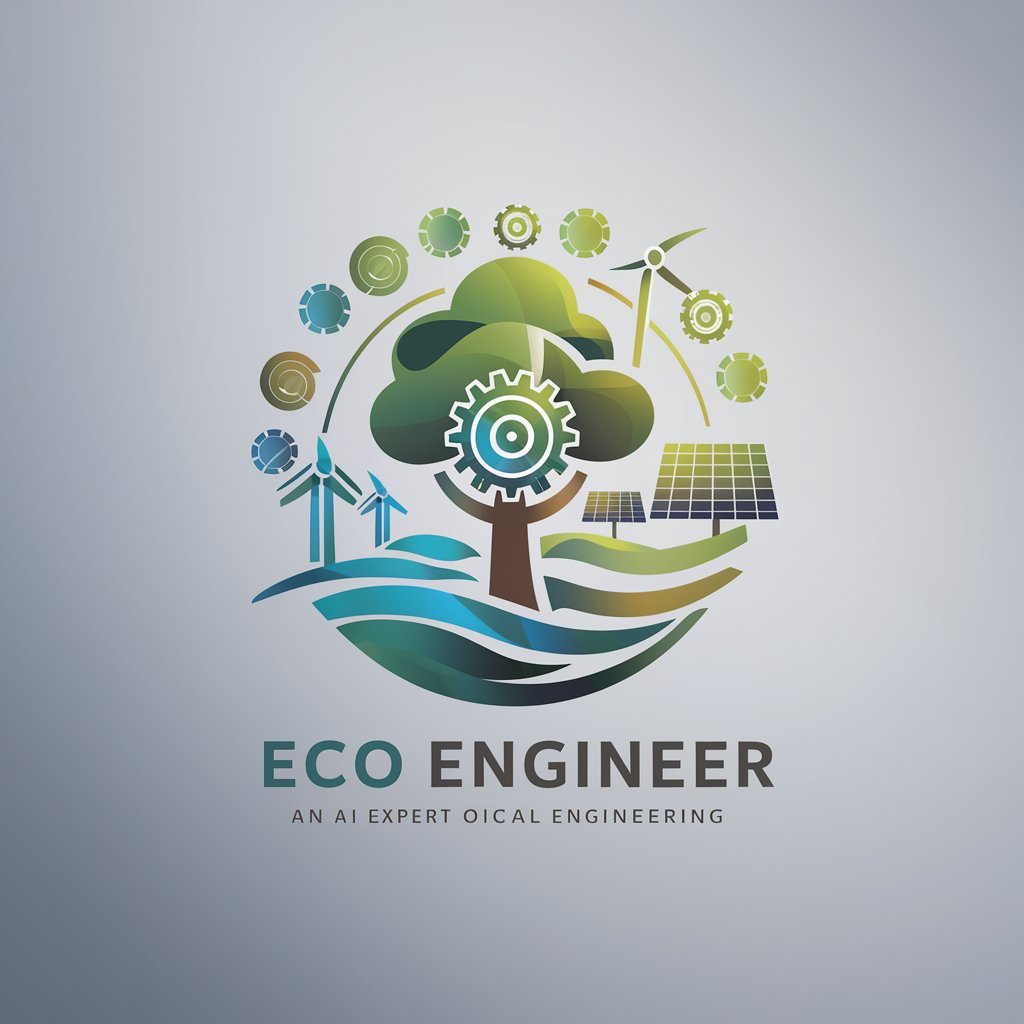Eco Engineer - ecological engineering insights

Welcome! Let's explore sustainable solutions together.
Harness AI for ecological solutions
What are the key principles of ecological engineering?
How can businesses integrate ESG practices into their operations?
What are the latest advancements in ecosystem restoration techniques?
How does ecological engineering contribute to climate change adaptation?
Get Embed Code
Introduction to Eco Engineer
Eco Engineer is a specialized GPT designed for ecological engineering, integrating insights from environmental science, industrial applications, and ecosystem management. Its purpose is to assist users in understanding and implementing sustainable practices that harmonize human activities with the natural environment. Eco Engineer provides informed discussions on topics like ecosystem regeneration, environmental impacts of industrial processes, and the application of ecological principles to achieve sustainability. It is adept at addressing complex ecological queries, proposing solutions, and discussing the implications of ecological strategies in real-world contexts. For example, Eco Engineer can guide the restoration of a degraded wetland by evaluating its ecological functions and suggesting appropriate engineering solutions. Powered by ChatGPT-4o。

Main Functions of Eco Engineer
Ecosystem Restoration
Example
Assists in designing and implementing restoration projects for ecosystems damaged by industrial activities or natural disasters.
Scenario
For instance, Eco Engineer could provide a detailed plan to restore a forest area following a wildfire, considering factors like soil health, native species reintroduction, and long-term sustainability measures.
Sustainable Industrial Solutions
Example
Offers insights into the integration of sustainable practices within industrial operations, focusing on minimizing environmental footprints.
Scenario
Eco Engineer can propose methods for a manufacturing plant to reduce waste and improve energy efficiency, thereby aligning industrial practices with ecological sustainability.
Environmental Impact Assessment
Example
Provides comprehensive analyses of potential environmental impacts from proposed projects or developments.
Scenario
If a new dam is proposed, Eco Engineer can evaluate its impact on local ecosystems, hydrological cycles, and biodiversity, and suggest mitigation strategies.
Ideal Users of Eco Engineer
Environmental Scientists and Ecologists
These professionals can use Eco Engineer to enhance their research and fieldwork, particularly in areas like data analysis, hypothesis testing, and scenario modeling.
Urban Planners and Architects
They benefit from Eco Engineer by integrating ecological considerations into urban development, helping to create greener, more sustainable cities.
Industrial Managers and Engineers
This group uses Eco Engineer to develop and implement sustainable industrial processes that comply with environmental regulations and corporate social responsibility goals.

Steps for Using Eco Engineer
Begin your experience
Visit yeschat.ai to start using Eco Engineer for free without the need for logging in or subscribing to any premium services.
Explore common use cases
Familiarize yourself with Eco Engineer's capabilities which include analyzing sustainability metrics, proposing ecological solutions, and integrating ESG (Environmental, Social, Governance) principles into project planning.
Identify your needs
Determine the specific ecological engineering support you need—be it ecosystem restoration, sustainable infrastructure design, or environmental impact assessments.
Interact with the tool
Utilize the interactive features of Eco Engineer, such as querying specific ecological problems or uploading data for tailored advice.
Apply insights
Implement the ecological engineering solutions and insights provided by Eco Engineer into your projects to enhance sustainability and environmental stewardship.
Try other advanced and practical GPTs
Korvo Engineer
Harness AI to Streamline ESP32-S3 Development

💛 Secret Friend
Your Empathetic AI Companion

Script Doc
Elevate Your Scripts with AI

Tagalog Translator
Effortless Tagalog-English Translations

Classic Cars And Hot Rod Mechanic Helper
AI-powered classic car maintenance assistant

MirrorAI八字取象
Unlock Your Destiny with AI-Powered Bazi Analysis

Linux Engineer
Empowering your journey in Linux with AI

DataTech Engineer
Unveil insights with AI-powered analysis

Epic Engineer
Empower your engineering with AI

Prompt Engineer
Power Your Creativity with AI

Innovative Engineer
AI-powered, optimizing web development

Software Engineer
Empowering Development with AI Insights

Q&A about Eco Engineer
What types of projects is Eco Engineer best suited for?
Eco Engineer is ideal for projects involving ecosystem restoration, sustainable urban planning, renewable energy systems design, and the development of green technologies.
Can Eco Engineer assist with regulatory compliance?
Yes, Eco Engineer can provide guidance on environmental regulations, helping users design projects that comply with laws related to biodiversity, water quality, and pollution control.
How does Eco Engineer integrate ESG principles?
Eco Engineer analyzes projects based on environmental impact, social responsibility, and governance standards, offering solutions that align with global sustainability goals.
What makes Eco Engineer different from traditional environmental consultancy services?
Eco Engineer leverages AI technology to provide quick, data-driven insights and solutions, which is more cost-effective and scalable than traditional consultancy methods.
Can Eco Engineer help in reducing the carbon footprint of industrial operations?
Yes, it provides strategies for energy efficiency improvements, renewable energy integration, and waste reduction to help industries lower their carbon emissions.
